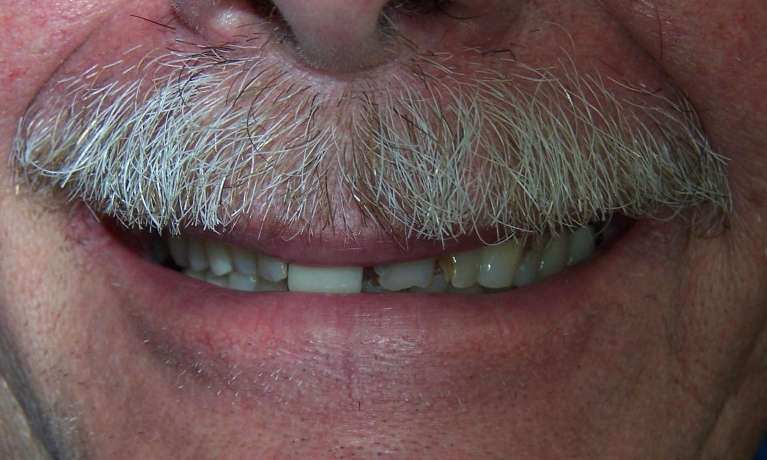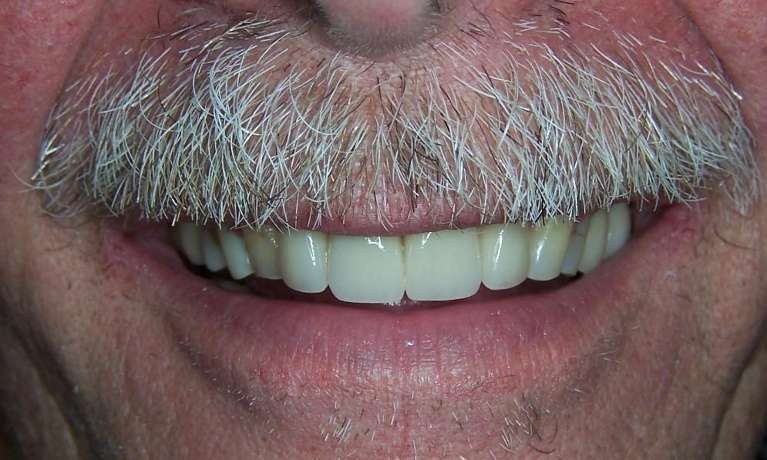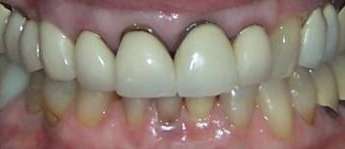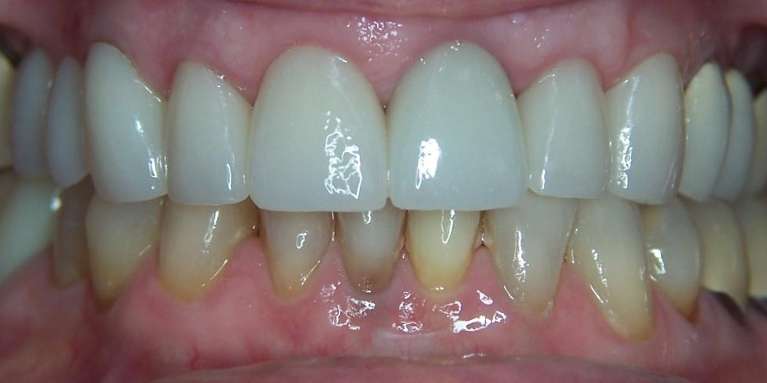
Cosmetic Dentistry in Los Gatos
While most people feel strongly about the appearance of their teeth, the unfortunate trend is that six out of ten Americans wish they could change something about their teeth. In addition, the same study reveals that most young people under 45 cover their mouths when they laugh because they feel self-conscious.
What are the top things people would change about their smile? Number one is whiter teeth, followed by straighter teeth and addressing receding gums. The good news is that the team at James Lin, DMD can address each of these conditions, and many more, through the cosmetic dental services we offer for our neighbors in Los Gatos, Saratoga, Monte Sereno, West San Jose, Campbell, Cambrian Park, Willow Glen, Fruitdale, Robertsville, and Alamitos.
Cosmetic Dentistry: Illuminating Smiles, Fortifying Bites, Boosting Confidence
The most effective and efficient path to a strong, healthy bite and a bright, beaming smile than cosmetic dentistry.
Beaming White Teeth
Professional teeth whitening restores your smile’s brilliance, leaving a lasting impression.
Customized Care
From porcelain veneers to dental bonding, cosmetic treatments are tailored to unique aesthetic goals.
Self-Confidence
There’s no surer way to feel your most confident, personally and professionally, than with a flawless smile.
Cosmetic Dentistry Addresses Smile Needs

Cosmetic dentistry at Dr. Lin’s Los Gatos dental office can help with a range of tooth flaws, such as:
- Chipped, cracked, or broken teeth
- Stained or yellow teeth
- Teeth that appear mismatched in size or shape
- Gaps or uneven spacing between teeth
- Minor to moderate tooth misalignments
We Provide Custom Treatment Plans
The first stop on your journey to a new smile is a complete exam, x-rays, and photos. We can discuss the specific problems that bother you most at this appointment, including your timing and budgetary concerns. For example, if you have an upcoming life event such as a wedding or graduation, we want your treatments to be performed in time for the best results.
Porcelain Veneers and Dental Bonding for Tooth Surface Flaws
 Many tooth challenges above respond well to dental bonding and porcelain veneers. However, these are two different approaches to enhancing the most visible tooth surfaces, especially on your front-facing teeth. Dr. Lin will help you decide which is best for you.
Many tooth challenges above respond well to dental bonding and porcelain veneers. However, these are two different approaches to enhancing the most visible tooth surfaces, especially on your front-facing teeth. Dr. Lin will help you decide which is best for you.
Dental bonding is a process that uses the same durable composite resins found in tooth-colored fillings. First, Dr. Lin will select a composite shade that matches your natural teeth. Then, Dr. Lin will shape the composite material to fill in gaps between teeth, rebuild chipped teeth, and correct other shape discrepancies.
The final step is curing the composite with a special light that hardens it immediately. Dental bonding may last many years, especially if you are careful with maintaining them.
For more extensive teeth flaws and discrepancies, Dr. Lin may recommend porcelain veneers as an option. These are thin porcelain shells that are custom-made to cover the front surfaces of one or more teeth. We slightly adjust the fronts of your teeth to improve the adhesion of the veneers. We take impressions as a blueprint when the lab makes your porcelain veneers. Once created, they will be permanently cemented to the fronts of your teeth.
You can expect your new veneers to last for roughly ten years with proper care and maintenance. Veneers can withstand quite a lot of pressure and are incredibly durable. In addition, they blend seamlessly with the rest of your smile for a natural, beautiful look.
Porcelain Dental Crowns for Total Tooth Coverage
In cases where a tooth is more damaged than bonding or a veneer can remedy, a dental crown can provide protection and durability. A crown fits over the entirety of a tooth like a helmet, protecting it on all sides. Dental crowns are most appropriate for severely discolored teeth that won’t respond to other treatments. A crown may also protect damaged or decayed teeth and achieve a life-like appearance and functionality of natural teeth.
Meet Our Doctor:

Dr. James Lin DMD
Dentist
Dr. James Lin was born and raised in Cupertino. He earned his Doctorate of Dental Medicine from the University of Pittsburgh. While in dental school, Dr. Lin was awarded the prestigious Albert Schweitzer Fellowship to provide preventative oral health care to children with cortical visual impairment.
After dental school, he completed a general practice residency at the VA Hospital, Mott Children’s Hospital, and the University of Michigan Hospital. In these capacities, he pursued advanced training in implantology, endodontics, oral surgery, and pediatric dentistry. Dr. Lin has since served his patients in ...
Frequently Asked Questions
If you've considered making changes to the appearance of your smile, you might want to consider cosmetic dentistry in Los Gatos, CA.
cosmetic dentistry in Los Gatos, CA.
At James Lin, DMD. We offer several cosmetic dental services to help you achieve your smile goals, and Dr. Lin has helped hundreds of patients get the beautiful smiles they've always wanted.
Some Of The Cosmetic Services We Offer:
- Tooth-colored fillings: Restore cavities with fillings that blend flawlessly with the shade of your teeth so they're not noticeable.
- Dental bonding and veneers: Eliminate cosmetic concerns like gaps between teeth, oddly shaped teeth, excessively worn or broken teeth, or stained or discolored teeth.
- Porcelain crowns: Rebuild decayed, fractured, or damaged teeth.
- Professional teeth whitening: For the whiter, brighter smile you want.
- White spot treatment: Eliminates stubborn spotting that mars the appearance of your teeth.
Schedule an Evaluation with Dr. Lin
If you'd like to learn more about what's possible for your smile, the first step is to book an evaluation with Dr. Lin. During this time, he'll discuss your goals and desires for your smile and gather information about your teeth and dental health to recommend the best treatment.
You can book an evaluation online or call our team at (408) 358-2161.
Porcelain veneers are cosmetic dental prosthetic devices that enhance the appearance of a person's smile. This is achieved by bonding the veneers, which are thin porcelain overlays, to the fronts of discolored, chipped, misaligned, or otherwise irregular-looking teeth.
discolored, chipped, misaligned, or otherwise irregular-looking teeth.
Technically speaking, a set of porcelain veneers itself is not permanent. In the event of damage or staining, a dentist can remove one set of veneers from a person's teeth and bond another brand-new set into place.
Learn About The Veneers Process
However, dental veneers are not reversible. This is because the process by which they're bonded to the natural teeth involves the removal of a thin layer of tooth enamel to ensure a proper fit. Since tooth enamel neither regenerates nor is replicable artificially, this is considered a permanent, non-irreversible alteration that will threaten the original tooth structure without the protection provided by dental veneers.
It's thus crucial that anyone considering porcelain veneers as a cosmetic solution consult with a qualified cosmetic dental professional before committing to the procedure.
Call Us for Porcelain Veneers in Los Gatos, CA
If you are in the Champaign area and want to learn more about getting dental veneers and maximizing their longevity, contact dentist Dr. James Lin, DMD, to schedule a consultation!
Gaps between teeth, whether small or more noticeable, can affect your self-confidence, bite integrity, and overall oral health. Fortunately, there are several effective ways to close these gaps, mitigate these risks, and improve your smile aesthetics. With a trusted dentist in Los Gatos, such as Dr. James Lin, DMD, patients have access to advanced restorative and cosmetic solutions tailored to their individual needs and goals.
overall oral health. Fortunately, there are several effective ways to close these gaps, mitigate these risks, and improve your smile aesthetics. With a trusted dentist in Los Gatos, such as Dr. James Lin, DMD, patients have access to advanced restorative and cosmetic solutions tailored to their individual needs and goals.
How Does Dr. James Lin, DMD, Address Gaps?
Depending on the size and cause of your tooth gaps, treatment options may include:
- Dental bonding — A quick and non-invasive option using tooth-colored resin to fill gaps. Ideal for small spaces.
- Porcelain veneers — Thin, custom-made shells that cover gaps and instantly improve smile aesthetics.
- Clear aligners — Discreet orthodontic treatment that gradually moves teeth into proper alignment using sets of mouthpiece-like trays.
- Dental crowns — For teeth requiring both functional and cosmetic restoration.
- Dental bridges — For gaps caused by tooth loss, bridges can fill the space and restore bite function.
Dr. Lin will evaluate your teeth and recommend the most effective solution based on your smile goals and dental health.
Effective, Pain-Free Gap Repair and Dental Bonding in Los Gatos
If you’re in Los Gatos and want to explore your options for closing tooth gaps, contact Dr. James Lin and our caring, skilled team to schedule your personalized consultation today!
If you’re unhappy with the way your smile looks—whether it’s because of chips, cracks, gaps, discoloration, or uneven teeth—cosmetic dentistry may be the right solution for you. At the office of Dr. James Lin, a trusted cosmetic dentist in Los Gatos, we offer a range of cosmetic treatments that can transform your smile and boost your confidence.
discoloration, or uneven teeth—cosmetic dentistry may be the right solution for you. At the office of Dr. James Lin, a trusted cosmetic dentist in Los Gatos, we offer a range of cosmetic treatments that can transform your smile and boost your confidence.
What Types of Cosmetic Services Do You Offer?
Dr. Lin provides several advanced cosmetic options, including:
- Dental Bonding — This is ideal for repairing chips, cracks, or small gaps using tooth-colored composite resin.
- Porcelain Veneers — These thin, custom-made shells cover the front of teeth to correct discoloration, unevenness, or minor misalignment.
- Professional Teeth Whitening — Professional whitening brightens stained or yellowed teeth with safe and effective in-office treatments.
- Clear Aligners — Straighten mildly misaligned teeth without traditional braces.
- Smile Makeovers — We tailor a combination of treatments to your individual smile goals.
How Do I Know If I’m a Good Candidate?
If you have healthy gums and teeth but want to improve the appearance of your smile, cosmetic dentistry could be a great fit. As a skilled Los Gatos cosmetic dentist, Dr. Lin will assess your needs and create a treatment plan designed just for you.
Call Our Dentist in Los Gatos Today!
Ready to explore your options? Schedule a consultation today!
Tooth discoloration can occur for several reasons, and the cause plays a key role in determining the most effective treatment. Dr. Lin carefully evaluates the source of discoloration before recommending treatment.
effective treatment. Dr. Lin carefully evaluates the source of discoloration before recommending treatment.
Types of Tooth Stains
- Extrinsic — Some stains are extrinsic, meaning they affect the outer layer of tooth enamel and are commonly caused by foods, drinks, or tobacco use.
- Intrinsic — Other types of discoloration are intrinsic, living below the enamel and often linked to genetics, certain medications, trauma, or metallic fillings that become more noticeable as enamel thins over time.
Professional Teeth Whitening: A Non-Invasive First Step
For surface-level staining, Dr. Lin may recommend professional teeth whitening. This treatment is typically performed after one of our hygienists completes a thorough cleaning and polishing to ensure your teeth are in ideal condition to absorb the whitening agents evenly. Our at-home whitening system includes custom-made trays and professional-strength whitening gel so you can brighten your smile in the comfort of your own home.
Porcelain Restorations for Deeper Stains
When discoloration does not respond to whitening, cosmetic restorations may be the best solution. Options such as dental bonding, porcelain veneers, or porcelain crowns can effectively cover stains while enhancing the shape and overall appearance of your teeth.
Call Your Los Gatos Cosmetic Dentist Today
Contact our dental office to learn how Dr. Lin can help restore brightness and confidence to your grin.
We look forward to helping you achieve your dream smile!
Premier Cosmetic Dentistry in Los Gatos, CA
While your oral health is our top priority, we also want your teeth to look just as beautiful on the outside as they are on the inside. So feel free to give the dental office of James Lin, DMD, a call to learn more about how we can work with you to achieve your smile goals.
Featured Blog Posts - Cosmetic Dentistry
Ultimate Guide to Icon Resin Filtration Part 2
Now that your white spots are gone, you'll want to learn what to expect after treatment and how to maintain your beautiful new smile. Here are some common questions we hear from patients after ICON resin infiltration treatment.
How Soon Will I See the Results After the Treatment?
Because the resin now resides in your tooth's pores and has been cured with a special light to harden it, it takes on the shade of your tooth for immediate results. Our patients love that resin infiltration treatment is essentially non-invasive, as they typically ...
What Cosmetic Dentistry Services Do You Offer?

For patients looking to improve their smiles (or even transform them), we offer a wide selection of cosmetic dentistry options to see you through to your goals. Of course, we start the process with a thorough consultation to ensure your candidacy. This includes an exam and conversation with your Los Gatos dentist.
Let’s explore cosmetic dentistry and how the various options can help you.
Options for Cosmetic Dentistry in Los Gatos, CA
Professional Teeth Whitening
When whitening teeth, we encourage you to stick with the professionals for the best results and the safest ...



